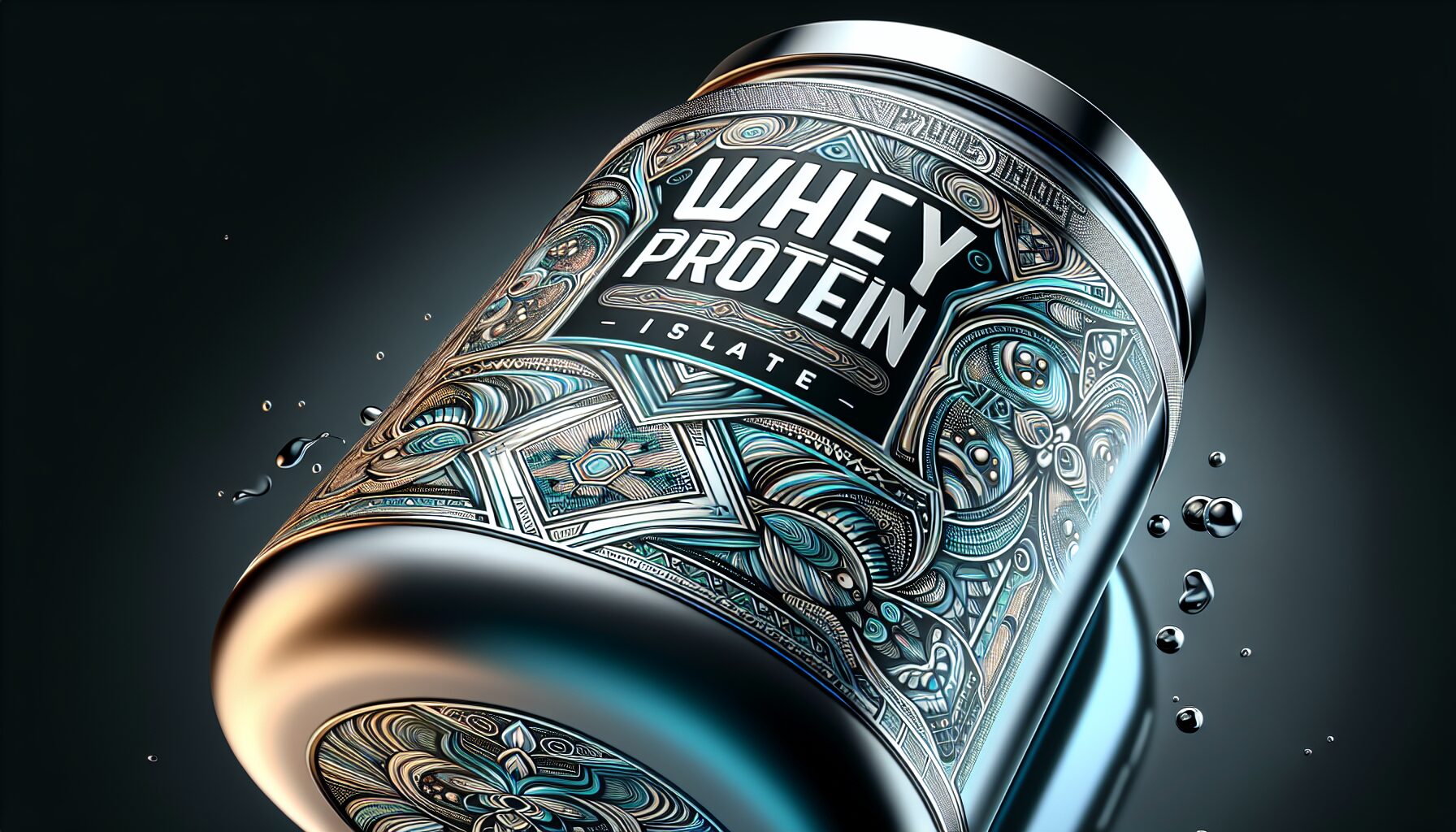Hey there! Looking for a protein-packed way to support your fitness goals? Look no further than Whey Protein Isolate. This popular supplement, known for its high protein content, is derived from whey, which is a byproduct of cheese production. With its ability to promote muscle growth, aid in post-workout recovery, and support weight management, Whey Protein Isolate has become a go-to choice for both professional athletes and everyday fitness enthusiasts alike. So, if you’re ready to take your nutrition game to the next level, let’s explore the incredible benefits of Whey Protein Isolate together!

What is Whey Protein Isolate?
Definition
Whey protein isolate (WPI) is a high-quality, protein-rich supplement that is derived from whey, the liquid portion of milk that separates during the cheese-making process. It undergoes a filtration process to remove most of the lactose, fat, and carbohydrates, resulting in a more concentrated and pure form of protein.
Production Process
The production of whey protein isolate begins with the collection of whey, which is a byproduct of cheese production. The whey is then filtered to remove impurities such as fat, lactose, and carbohydrates. This filtration process typically involves the use of microfiltration or ion exchange techniques.
Microfiltration involves passing the whey through special filters that separate the protein molecules from other components. This process helps to retain the nutritional integrity of the protein while removing unwanted impurities.
Ion exchange, on the other hand, involves the use of charged particles to attract and bind certain components, allowing the separation of proteins from lactose and other unwanted substances.
Once the filtration process is complete, the remaining liquid is subjected to further processing techniques such as drying and isolation to remove any remaining moisture and concentrate the protein content. The result is a high-quality whey protein isolate powder that is popular in the fitness and bodybuilding community.
Benefits of Whey Protein Isolate
Muscle Building
One of the primary benefits of whey protein isolate is its ability to aid in muscle building and recovery. Whey protein isolate contains a high concentration of essential amino acids, including leucine, which plays a crucial role in muscle protein synthesis.
When consumed before or after a workout, whey protein isolate provides a quick source of amino acids that are readily utilized by the muscles to repair and rebuild. This helps to accelerate muscle recovery, enhance lean muscle mass growth, and improve overall strength and athletic performance.
Weight Loss
In addition to its muscle-building benefits, whey protein isolate can also support weight loss efforts. Its high protein content helps to increase satiety and reduce appetite, making it an excellent addition to a calorie-controlled diet.
Furthermore, whey protein isolate may boost metabolism by increasing the thermic effect of food. This means that your body requires more energy to digest and process protein compared to fats and carbohydrates, resulting in an increased calorie burn.
Additionally, the consumption of whey protein isolate has been shown to help preserve lean muscle mass while promoting fat loss. This is crucial, as maintaining muscle mass during weight loss can help prevent a decline in metabolism and ensure that weight loss primarily comes from fat stores.
Digestive Health
Whey protein isolate is easily digestible, making it an ideal protein source for individuals with digestive issues. It is lower in lactose content compared to whey protein concentrate, making it suitable for those who are mildly lactose intolerant.
Furthermore, whey protein isolate contains bioactive peptides, which are small protein fragments that have been shown to have various health benefits. These peptides can help support a healthy digestive system by promoting the growth of beneficial gut bacteria, improving gut barrier function, and reducing inflammation.
Nutritional Content of Whey Protein Isolate
Protein
As the name suggests, whey protein isolate is primarily composed of protein. It is known for its high protein content, typically ranging from 90% to 95% protein per serving. This makes it an excellent choice for individuals looking to increase their protein intake without consuming excess calories, fat, or carbohydrates.
Amino Acids
Whey protein isolate is a complete protein source, meaning it contains all nine essential amino acids that the body cannot produce on its own. These amino acids play a vital role in various physiological processes, including muscle repair, immune function, and hormone production.
Of particular importance is the amino acid leucine, which is abundant in whey protein isolate. Leucine is known for its ability to stimulate muscle protein synthesis and promote muscle growth.
Carbohydrates
Whey protein isolate is very low in carbohydrates, with most products containing less than 1 gram of carbohydrates per serving. This makes it an ideal option for individuals following low-carbohydrate or ketogenic diets.
Fat
The fat content of whey protein isolate is generally minimal, with most products containing less than 1 gram of fat per serving. This makes it a suitable choice for those watching their fat intake.
Vitamins and Minerals
While whey protein isolate is not a significant source of vitamins and minerals, it does contain small amounts of certain nutrients. These include calcium, iron, and B vitamins, which can contribute to overall nutrient intake.
How to Use Whey Protein Isolate
Dosage
The appropriate dosage of whey protein isolate can vary depending on individual needs and goals. As a general guideline, it is recommended to consume 20-30 grams of whey protein isolate per serving. This amount has been shown to effectively stimulate muscle protein synthesis and support muscle recovery.
For optimal results, it is advised to spread protein intake evenly throughout the day and consume whey protein isolate as part of a well-balanced diet.
Timing
To maximize the muscle-building and recovery benefits of whey protein isolate, it is best to consume it within the post-workout window, ideally within 30 minutes to an hour after exercise. During this time, the muscles are highly receptive to nutrients, and the rapid absorption of whey protein isolate helps to replenish amino acid stores and kickstart the recovery process.
Whey protein isolate can also be consumed at other times of the day, such as in the morning or as a snack between meals, to support overall protein intake.
Preparation
Whey protein isolate is most commonly available in powdered form and can be mixed with water, milk, or other beverages to create a protein shake. It can also be added to smoothies, baked goods, or other recipes to boost protein content.
When preparing a protein shake, simply combine the desired amount of whey protein isolate powder with your chosen liquid in a shaker bottle or blender and mix until well blended. Adjust the liquid amount to achieve your preferred consistency.

Whey Protein Isolate vs. Other Protein Supplements
Whey Protein Concentrate
Whey protein isolate and whey protein concentrate (WPC) are two popular forms of whey protein. While both are derived from whey, they differ in terms of their protein content and processing methods.
Whey protein isolate undergoes a more extensive filtration process compared to whey protein concentrate, resulting in a higher protein content per serving. It also tends to be lower in lactose, fat, and carbohydrates compared to whey protein concentrate.
Whey protein concentrate, on the other hand, retains more of the natural components found in whey, including some lactose and fat. It generally contains around 70-80% protein per serving.
Ultimately, the choice between whey protein isolate and whey protein concentrate depends on individual dietary preferences and goals. Whey protein isolate is often favored by those seeking a higher protein concentration and lower lactose and carbohydrate content.
Casein Protein
Casein protein is another dairy-based protein supplement that is derived from milk. It differs from whey protein isolate in terms of its digestion rate and amino acid profile.
Casein protein is known for its slow digestion rate, providing a sustained release of amino acids over a longer period. This makes it a popular choice for individuals looking for a protein source that can provide prolonged muscle nourishment, especially before bedtime or during periods of fasting.
While whey protein isolate is commonly consumed in the post-workout window for its rapid absorption, casein protein can be a valuable addition to support overall protein needs throughout the day.
Soy Protein
Soy protein is a plant-based protein source that is derived from soybeans. It is a suitable alternative to whey protein isolate for individuals following vegetarian or vegan diets or those with dairy allergies or intolerances.
Soy protein is a complete protein source, containing all essential amino acids. It is particularly rich in the amino acid glutamine, which supports immune function and muscle recovery.
While whey protein isolate generally has a higher protein content per serving compared to soy protein, soy protein offers additional health benefits, such as supporting heart health and reducing cholesterol levels.
Pea Protein
Pea protein is another plant-based protein source that is derived from yellow split peas. It is an excellent option for individuals with allergies or intolerances to dairy, soy, or other common protein sources.
Pea protein is rich in essential amino acids, particularly branched-chain amino acids (BCAAs), which are essential for muscle growth and repair. It is also a good source of iron, making it a suitable choice for individuals with iron deficiencies or those following a vegetarian or vegan diet.
While whey protein isolate remains popular for its high protein content and rapid absorption, pea protein provides a viable alternative for those seeking plant-based protein options.
Hemp Protein
Hemp protein is derived from the seeds of the cannabis plant and is a complete plant-based protein source. It contains all essential amino acids, omega-3 and omega-6 fatty acids, and various vitamins and minerals.
Hemp protein is well tolerated by most individuals and has a pleasant nutty flavor. While it may not have as high a protein content as whey protein isolate, it offers additional nutritional benefits such as fiber and healthy fats. It is particularly popular among those following a plant-based or vegan lifestyle.
Safety and Side Effects of Whey Protein Isolate
Allergies
While whey protein isolate is generally considered safe for most individuals, it is important to note that it is derived from milk and may not be suitable for those with dairy allergies or lactose intolerance.
Individuals with dairy allergies should opt for plant-based protein sources such as soy protein, pea protein, or hemp protein.
Digestive Issues
Some individuals may experience digestive issues such as bloating, gas, or upset stomach when consuming whey protein isolate. This is often due to lactose intolerance or sensitivity to certain ingredients used in the manufacturing process.
To minimize digestive issues, it is advisable to start with a smaller serving size and gradually increase the amount over time. Additionally, choosing a whey protein isolate that is lower in lactose and free from artificial additives or sweeteners may help reduce digestive discomfort.
If digestive issues persist or worsen, it is recommended to consult a healthcare professional or consider alternative protein sources.

Choosing the Right Whey Protein Isolate
Quality and Purity
When selecting a whey protein isolate, it is important to choose a reputable brand that prioritizes quality and purity. Look for products that undergo third-party testing to ensure label accuracy and are sourced from trusted dairy sources.
Additionally, opt for whey protein isolate that is free from artificial additives, flavors, and sweeteners. The fewer ingredients listed on the label, the better.
Flavors and Sweeteners
Whey protein isolate is available in a variety of flavors, ranging from chocolate and vanilla to strawberry and cookies and cream. Choose a flavor that you enjoy to make your protein shakes more enjoyable.
However, be mindful of the sweeteners used in flavored whey protein isolate. Some products may contain high amounts of artificial sweeteners or sugar substitutes, which can lead to digestive issues or other adverse effects in some individuals. Opt for products that utilize natural sweeteners or are unsweetened if you have concerns about artificial additives.
Certifications
Look for whey protein isolate products that have undergone third-party certifications for quality and purity. Certifications such as NSF Certified for Sport, Informed-Choice, or USDA Organic indicate that the product has been tested for banned substances, meets strict quality standards, and contains the ingredients listed on the label.
These certifications provide assurance of product safety and quality, particularly for competitive athletes or individuals concerned about the legitimacy of the product.
Customer Reviews
Reading customer reviews can provide valuable insights into the taste, mixability, and overall quality of a whey protein isolate product. Look for products with positive reviews and a high number of satisfied customers.
However, keep in mind that individual preferences may vary, and what works for one person may not work for another. It is advisable to try different brands or flavors to find the whey protein isolate that suits your taste and dietary needs.
FAQs about Whey Protein Isolate
Is Whey Protein Isolate suitable for vegetarians/vegans?
Whey protein isolate is derived from milk, making it unsuitable for vegetarians and vegans. However, there are several plant-based protein options available, such as soy protein, pea protein, and hemp protein, that are suitable for individuals following a vegetarian or vegan lifestyle.
Can I take Whey Protein Isolate if I am lactose intolerant?
Whey protein isolate goes through a filtration process that removes most of the lactose, making it a suitable option for individuals with lactose intolerance. However, individuals with severe lactose intolerance may still experience digestive issues and may need to consider alternative protein sources.
Can Whey Protein Isolate help with muscle recovery?
Yes, whey protein isolate is an excellent supplement for muscle recovery. Its rapid absorption and high concentration of essential amino acids, particularly leucine, support muscle protein synthesis and aid in the repair and rebuilding of muscle fibers post-workout.
Is it safe to consume Whey Protein Isolate during pregnancy or breastfeeding?
While whey protein isolate is generally safe for most individuals, it is advisable for pregnant or breastfeeding women to consult their healthcare provider before incorporating any new dietary supplements into their routine.
Is Whey Protein Isolate suitable for people with kidney issues?
Individuals with kidney issues should consult their healthcare provider before starting any new dietary supplement, including whey protein isolate. High protein intake may put additional strain on the kidneys, and individual circumstances should be taken into consideration.

Conclusion
Whey protein isolate is a valuable nutritional supplement for individuals looking to support their muscle-building goals, aid in weight loss efforts, and promote digestive health. It provides a concentrated and easily digestible source of high-quality protein, essential amino acids, and minimal carbohydrates and fats.
When choosing a whey protein isolate, consider factors such as quality, purity, flavors, sweeteners, certifications, and customer reviews to ensure you select a product that aligns with your preferences and dietary needs.
Remember to follow the recommended dosage and timing guidelines, and consult a healthcare professional if you have any concerns or underlying health conditions.
With its numerous benefits and versatility, whey protein isolate can be a valuable addition to a well-rounded fitness and nutrition routine.





